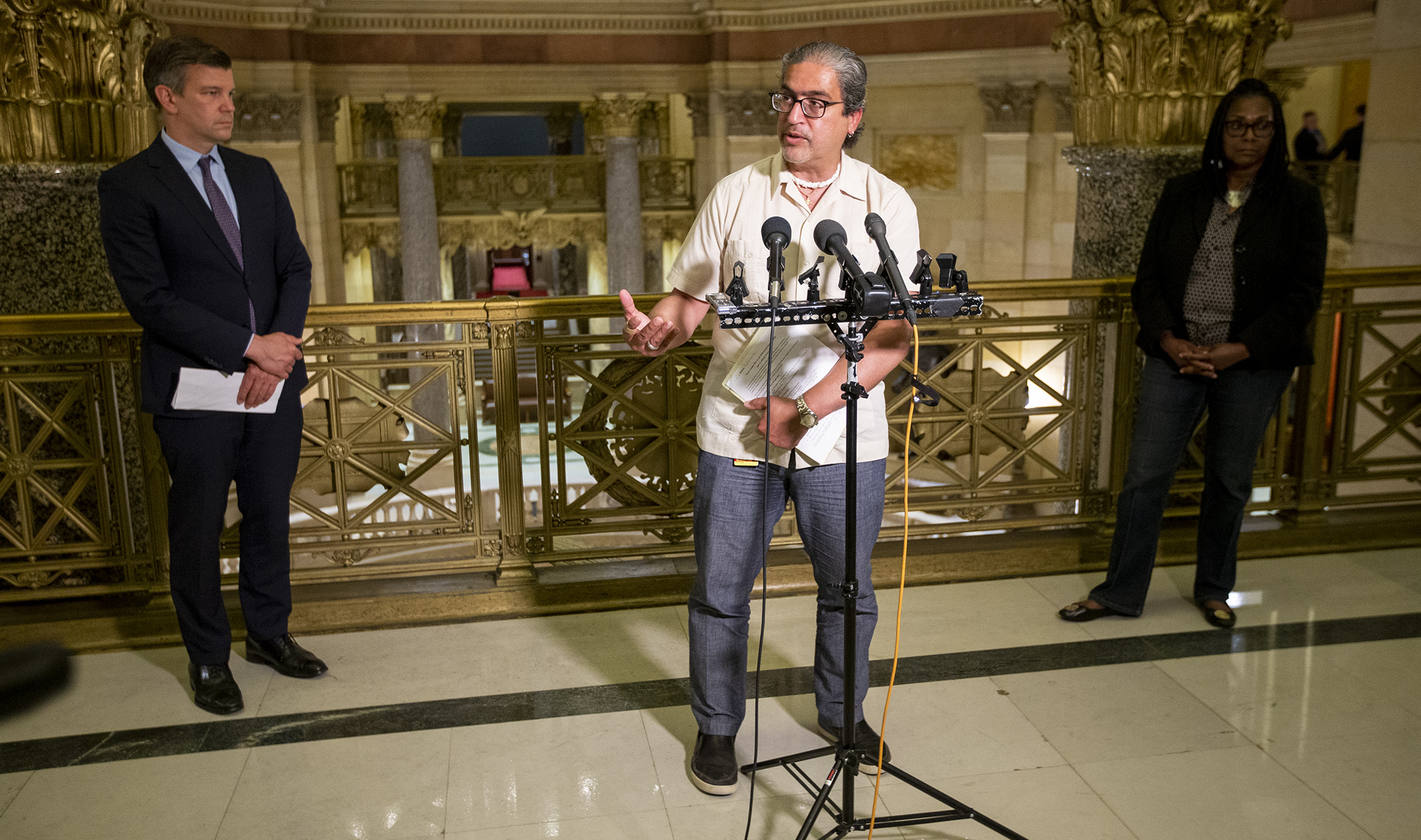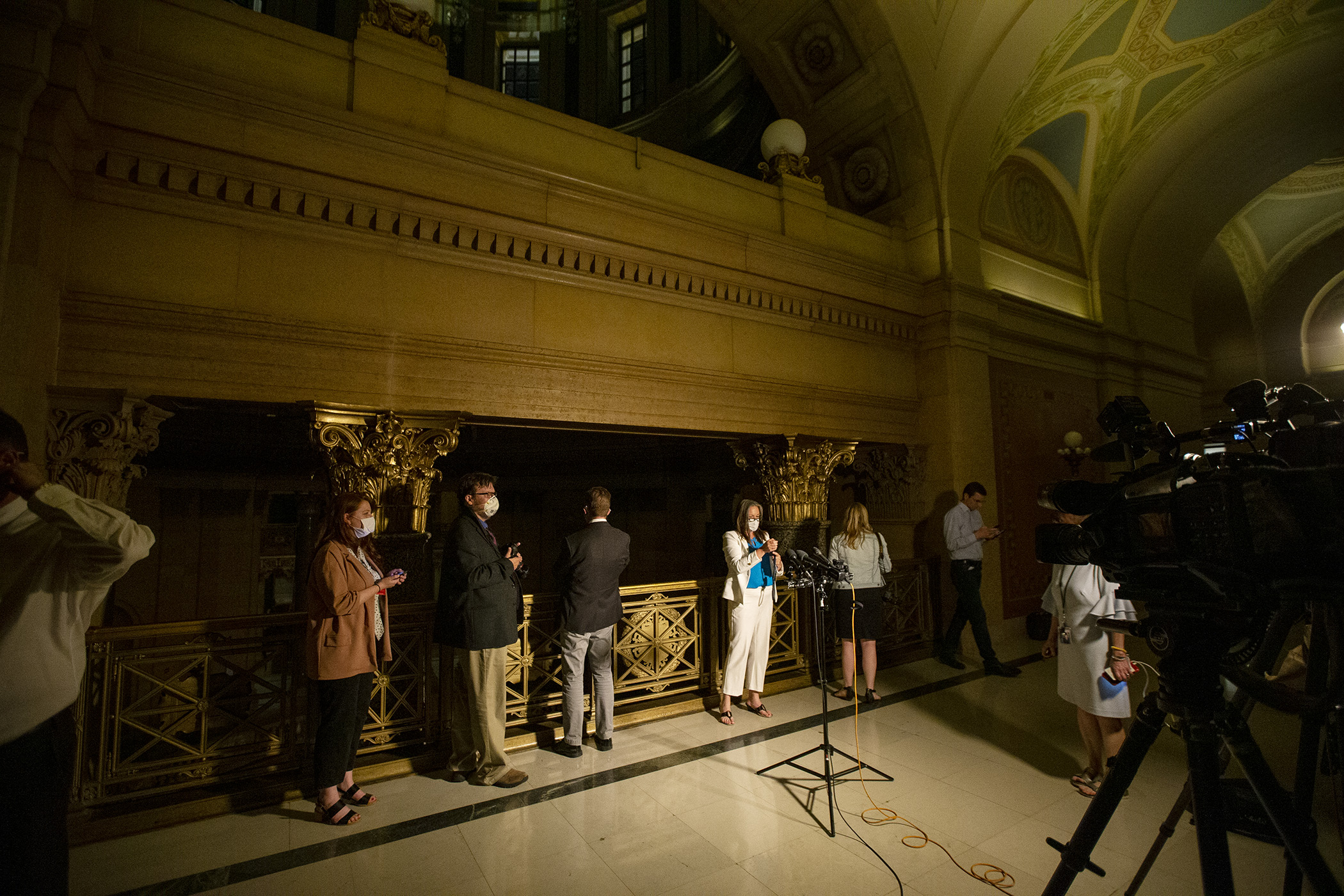Special session ends without agreement on policing overhaul, other key issues

They came. They debated. They couldn’t agree and they left.
Eight days of a special session was not enough for House and Senate lawmakers to reach agreement on a quartet of priority bills that included overhauling public safety and police accountability and allocating federal coronavirus funds to local units of government.
So, as the sun was coming up Saturday, both bodies adjourned sine die.
“Anger and frustration at a failure to accomplish major progress on the main issues in front of us — that Minnesotans need us to take action on — is certainly warranted in this situation,” said House Majority Leader Ryan Winkler (DFL-Golden Valley) from the House Floor just after 6:30 a.m. Saturday.
All along, Senate Majority Leader Paul Gazelka (R-East Gull Lake) had said the Senate would adjourn June 19. Technically, he was correct because a legislative day goes until 7 a.m.
"We need a break from each other and this place," he said.
“It is unfortunate the Senate decided that one week was all we could muster in order to address these issues because quite frankly they are much bigger than a week,” Winkler said. “… This creates a pause for us to go back, reflect a little bit on the need to get the job done for the people of Minnesota.”
Around midnight, Senate Republicans and the House People of Color and Indigenous Caucus traded offers on measures to beef up police accountability, including a removal of House provisions that the attorney general be in charge of all investigations of deaths involving a peace officer and the restoration of felon voting rights upon release from prison.
 Members of the media waiting for a House press conference mill about in the dark as the lights throughout the Capitol went out just after midnight. Photo by Paul Battaglia
Members of the media waiting for a House press conference mill about in the dark as the lights throughout the Capitol went out just after midnight. Photo by Paul BattagliaIn the end, however, it wasn’t enough to bridge the gap.
“I'm frustrated this morning because I actually thought that we were going to do some things together," Gazelka said. “We're not days away from some of the requests the House wanted; we are a session away. There's a lot of desire the House has, and I understand why, but I thought that in a special session that we would be able to do some significant things."
As for COVID-19 economic help, the Senate passed a bill that would disburse $841 million in federal coronavirus relief monies to the state’s counties, cities and towns. The House amended the legislation to add several items from the governor’s supplemental budget, including funds for direct care and treatment, personal care assistance, the state patrol and the Minnesota Zoo. SSHF128/SSSF47* was passed 77-55, but the Senate didn’t act upon the amended bill.
Republicans argued the final product violates an agreement earlier in the week between the four caucuses on distributing COVID-19 dollars.
Gazelka said a late-Friday night deal had been worked out where $58 million in supplemental spending would be in a separate bill.
“I don’t know what happened overnight,” House Minority Leader Kurt Daudt (R-Crown) said. “Caucuses seemed to go back in their corners and things got very quiet. When that happens it usually tells me that there was some fighting going on within caucuses about what should happen or shouldn’t happen, and probably within parties.
"I think we didn’t lay down our partisan hats and pick up our Minnesota hats.”
Both Gazelka and Hortman agreed that a bonding bill and funding related to the effects of the COVID-19 pandemic would be among the top priorities. While Gazelka added to his list of desires ending the governor’s emergency powers — which the House voted not to do — Hortman advocated for public safety measures that would address police accountability.
The latter emphasis — spurred by the Memorial Day death of George Floyd while in the custody of Minneapolis police — resulted in a suite of bills that became SSHF93/SSSF104*, passed 71-59 by the House early Friday after more than seven hours of debate.
A compendium of about two dozen bills, the legislation would set new parameters for the use of force by peace officers; lift a ban on residency requirements for officers; prohibit “warrior training” and require training on mental illness and autism; make changes in how officer-involved deaths are investigated and potentially tried; and restore voting rights to felons upon their release from custody, among other provisions.
The Senate passed five public safety bills that had some overlap with House measures, including a ban on choke holds, stress management for officers, and training in crisis intervention. Late Friday night, they added other measures to their public safety proposals, including changing the grievance arbitration procedure to potentially include administrative law judges; instructing officers to preserve the sanctity of life; and adding mandatory autism training.
But House Democrats and Walz pushed the Senate for stronger police accountability measures in negotiations at the Capitol.
“They did pass things that shouldn’t be hard, but they need to take a bigger bite,” Walz said. “We’re the center of a phenomenon that’s ripped this country for generations. If we don’t do this, I think we’re going to miss the momentum for real change.”
After Floyd’s death, riots, arson and vandalism swept through a few Twin Cities neighborhoods, with the most damage occurring in the commercial corridors of Minneapolis’ Lake Street and West Broadway and University Avenue in St. Paul. Another set of bills — a $300 million package dubbed the PROMISE Act — was designed to assist those areas in rebuilding with redevelopment and relief programs, grants, loans, tax exemptions and a dedicated sales tax.
The proposals were eventually combined in SSHF132, a bill that, as amended, was passed by the House on a 74-53 vote. The bill had no Senate companion.
Negotiations on a $1.35 billion bonding bill reportedly continued into the night.
“The bonding bill may not get done in time,” Gazelka said late Friday. “The tax bill is linked to that, with Section 179 (property expensing), so that may have to be down the road. If something is left undone, we’re willing to come back. … We are going to adjourn tonight. If we come to agreement, we’ll come back for a one-day session.”
But there were some bills upon which both bodies of the Legislature agreed with strong bipartisan support that are on their way to the governor’s desk for his signature:
An omnibus human services bill, SSHF11*/SSSF9, contains a variety of provisions related to child care, custody, support, foster care, disability services, community supports, civil commitment, maltreatment of minors, child protection and child support.
An omnibus education policy bill, SSHF33*/SSSF26, would support special education students by offering access to alternative delivery of specialized instruction services; require teachers to have mental health and suicide prevention training before they’re relicensed; and oblige schools to put in place evidence-based vaping prevention curriculum.
Extending human services program waivers and modifications made in response to the COVID-19 pandemic was the gist of SSHF105, which also appropriated money from the coronavirus relief fund for housing support.
The Child Care Assistance Program would have its reimbursement rate boosted for those who provide care for low-income children under SSHF41. The program provides subsidies that allow these children to access early childhood opportunities while their parents are working or in school.
One significant bill was approved in committee, but not brought up on the House Floor:
An omnibus environment and natural resources bill, SSHF28, would appropriate $64.2 million for fiscal years 2020-21 from the Environment and Natural Resources Trust Fund for land acquisition, habitat and recreation projects; research and management of invasive species; collecting data about natural resources and other projects.
— House Public Information Services' Mike Cook and Rob Hubbard contributed to this story
Related Articles
Search Session Daily
Advanced Search OptionsPriority Dailies
Ways and Means Committee OKs proposed $512 million supplemental budget on party-line vote
By Mike Cook Meeting more needs or fiscal irresponsibility is one way to sum up the differences among the two parties on a supplemental spending package a year after a $72 billion state budg...
Meeting more needs or fiscal irresponsibility is one way to sum up the differences among the two parties on a supplemental spending package a year after a $72 billion state budg...
Minnesota’s projected budget surplus balloons to $3.7 billion, but fiscal pressure still looms
By Rob Hubbard Just as Minnesota has experienced a warmer winter than usual, so has the state’s budget outlook warmed over the past few months.
On Thursday, Minnesota Management and Budget...
Just as Minnesota has experienced a warmer winter than usual, so has the state’s budget outlook warmed over the past few months.
On Thursday, Minnesota Management and Budget...